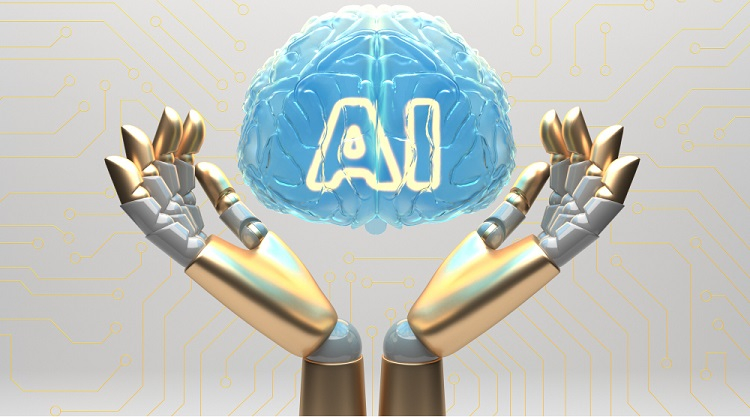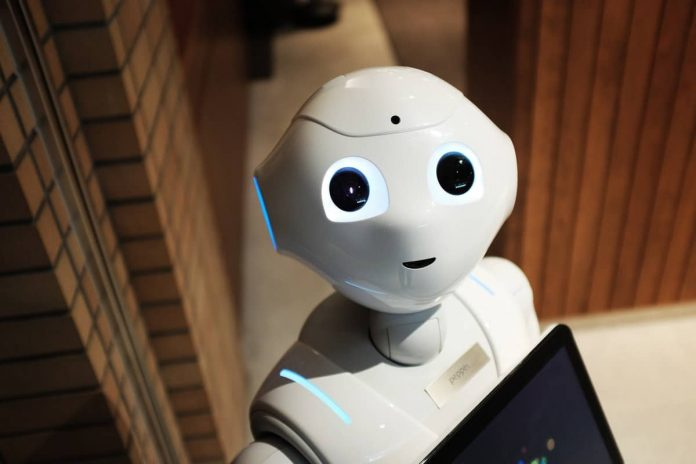Artificial intelligence enlarges the horizons of the possible, both in business and everyday life. The time when AI in business will change the picture of the world is around the corner.
Many of us still don’t understand that AI isn’t a distant prospect. This technology exists and helps us right now. Science fiction movies have raised a great misconception about what artificial intelligence really is and what its goal is.
In this post, we’ll figure out the purpose of AI in business, how it influences our everyday lives, and what benefits it brings to entrepreneurs.
Definition of Artificial Intelligence
To dispel all delusions about AI, remember that AI is not a robot. Artificial intelligence can be compared with a brain inside our bodies.

What we call artificial intelligence, in fact, is an artificial neural network. Basically, it’s a math model that copies the principles of biological neural networks.
AI-based algorithms have succeeded in a range of fields. AI is better than humans at speech and image recognition, text translation, data analysis, and other tasks. As for today, we can single out three main types of artificial intelligence:
Artificial General Intelligence (AGI). This type of AI reminds me of a human brain. It deals with all the tasks that a human can do. It can split tasks into sub-tasks, solve them in order, think critically and abstractly, and make use of previously gained experience.
Related: Artificial Intelligence: A key to Outsmart Cyber Attackers
Artificial superintelligence (ASI). An AI system that surpasses the capabilities of a human mind in almost every field.
Artificial Narrow Intelligence (ANI). ANI is an AI that has mastered a certain field of activity. It can manage a single, predefined task, like driving a car or playing chess. However, it can’t do anything else.
Right now, engineers have succeeded with ANI, or “weak” AI. Top-tier companies also focus on AGI, but it’s still far from perfect. Nevertheless, properly applied ANI can help in a range of activities.
Related: How Artificial Intelligence Systems Impact on HR Jobs?
Real-Life Use Cases of Artificial Narrow Intelligence
Because ANI deals with certain tasks better than a human brain, it can be used to automate a lot of routine processes and simplify our lives.

Let’s go through some of the most well-known use cases of ANI:
- A recommendation system in various streaming services like YouTube, Spotify, Netflix, and others is one of the most prominent examples of ANI.
- Waymo, a self-driving car project by Google, is one of the most promising trends. Waymo’s ANI handles both passenger and cargo transportation.
- Search systems in apps for searching flight tickets like Skyscanner, use AI to find the best offer that meets your needs;
- Google Translate is the best ANI-powered tool that helps millions of people every day.
Even though we call ANI a “weak” AI, don’t underestimate its capabilities. Artificial Narrow Intelligence represents the majority of today’s AI algorithms. It increases our efficiency and saves a lot of time on ordinary tasks.
The most adorable thing about ANI is that AI features are so perfectly fitted into the app that we don’t pay attention to them and take them for granted.
Related: The Use of AI in Digital Onboarding and Account Opening
Benefits of AI in Business
AI in business brings a lot of opportunities for businesses and ordinary people. The benefits of AI in business depend on business demands and requirements. But what specific advantages do we get from AI? Let’s single out each of them.

#1. Logistics
AI can transform the whole logistics industry with properly applied algorithms. AI helps to manage warehouses, collect data, and track inventory.
One of the most evident use cases is to predict the demand for the goods. Thus, the demanded products will be shipped to regional warehouses to shorten the delivery time and reduce expenses.
Besides, autonomous vehicles and loaders allow entrepreneurs to spend less on repetitive tasks and allocate the workforce to other types of work.
Related: AI is Leading To Groundbreaking Innovations in The World of EHRs
#2. FinTech
Artificial intelligence allows you to improve customer service, detect malicious transactions, conduct a risk assessment in lending, and help customers choose insurance.
AI algorithms allow financial officers to record, analyze, and detect an unlimited number of possible fraud cases. Besides, the system remembers the common behavior pattern of each customer and detects deviations from the behavior model.
With improved security systems, customers feel safer when using your software, so brand loyalty increases.
On top of that, AI algorithms paired with machine learning help analyze customers’ credit histories. Large volumes of data contain relevant information about spending, previous lending, earnings, and more.
Computers can analyze these sets of data to extract the necessary data to assess the client’s ability to repay the debt. Moreover, P2P lending businesses use visual identification and verification to authorize the user.
AI-based algorithms can assist in matching the user-provided visual data with that from the database.
#3. Farming
Artificial intelligence, in combination with IoT devices, lets you analyze the condition of both soil and crops. Moisture sensors detect the moisture level, analyze the data, and transmit it to watering devices.
Then, devices sprinkled the water all over the area. These systems come in handy for city farming. Vertical farms are uncomfortable for watering and fertilizing. That’s why automated systems help to take care of the plants effectively.
#4. Healthcare
AI in business healthcare helps physicians organize treatment effectively. AI technologies analyze the data from electronic health records and output possible treatment options.
In combination with healthcare devices, artificial intelligence can diagnose diseases and even perform surgeries. Besides, wearable devices allow physicians to track the patient’s health condition remotely.
#5. Chatbots
Chatbots are actually the software’s shell based on the specific messenger. It grants convenient access to the software for users. A chatbot at hand engages users to buy more products if you run an e-commerce business or order some sort of service you provide.
But what does AI have in common with chatbots? With AI, you can build a chatbot that doesn’t follow a predefined conversation pattern. Instead, they can hold a unique conversation that draws the customer’s attention.
Natural language processing (NLP) is responsible for interactions between people and machines. Simply put, NLP is a communication bridge between the user and the chatbot. Services like Alexa, Cortana, and Siri make use of NLP technology.
Wrapping Up
To sum up, AI in business technologies will soon take over the world. Even though they’re already influencing our lifestyle and the way we interact with the software, it’s capabilities are far greater.
AI in business will automate routine tasks, improve the employees’ workflow, and increase revenue. So, we can state with certainty that AI makes the life of every person more comfortable and easier.
For more Digital Technology Updates, and information about AI’s business benefits, visit CRECSO NEWS Magazine. Follow us on Facebook, Instagram, and Subscribe for Daily Updates in your mail box.









